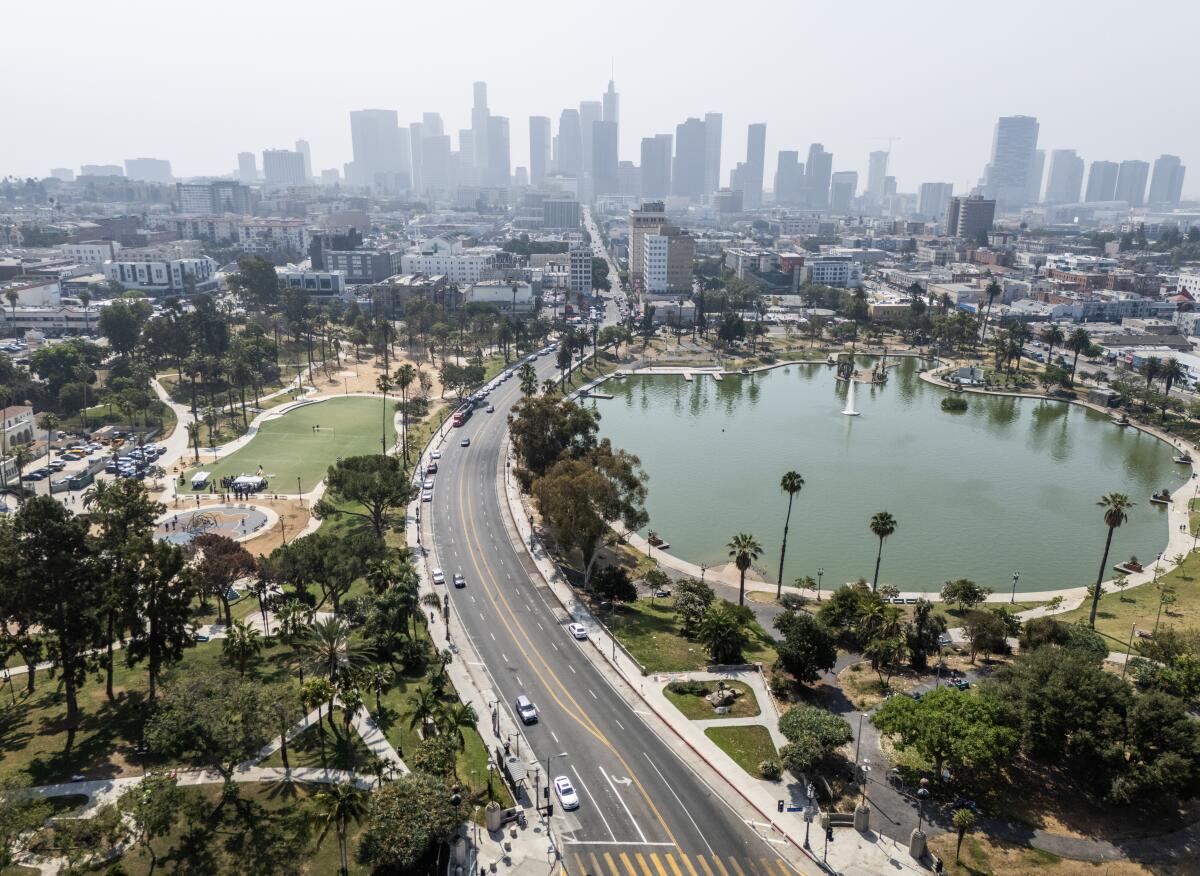
Good morning. I’m Kerry Cavanaugh, and it is Saturday, July 13. Here’s what’s happening in Opinion.
Los Angeles is known as a city of cars, so I enjoy reading stories about the time before motor vehicles dominated our urban landscape. Take, for example, MacArthur Park, which was called Westlake Park before it was renamed in 1942 to boost the presidential ambitions of Army Gen. Douglas MacArthur. The land was a swamp and a dump that in 1890 was transformed into a tropical paradise. The centerpiece of the park was a sprawling lake that was used for boating and model yacht races. There were bandshells for concerts, wide lawns and palm-lined buggy paths. Two streetcar lines ran alongside the park in a neighborhood that soon became an “exclusive, high-class residence district.”
It was a gem of a public park in a rapidly urbanizing city. Until the city decided that cars were more important than green space and plowed Wilshire Boulevard right through the middle of the park in 1934. The result was a park that was more of a “drive-through” rather than a destination, Jose A. Gardea wrote in his history of MacArthur Park. Who wants to picnic next to speeding cars and tailpipe fumes?
Now, 90 years later, Los Angeles may reclaim the road for the park. Councilmember Eunisses Hernandez has launched Reconnecting MacArthur Park, which aims to close the half-mile stretch of Wilshire Boulevard through the park. It’s a good idea, says The Times’ editorial board. “Where else could L.A. instantly add more than two acres of public open space in a park-poor neighborhood that is also one of the most densely populated communities in the country?”
Yes, closing the road and diverting vehicles around the park would be inconvenient and controversial with motorists. But other cities have done it, including Golden Gate Park in San Francisco and Central Park in New York City. It’s a recognition that built-out cities have plenty of space for cars and not nearly enough green space for people, so it’s worth some inconvenience to carve out more places where people can safely walk, bike and enjoy the outdoors.
Step aside, Joe. It’s time. Times columnist Jackie Calmes had been on the fence about Joe Biden’s continued candidacy since the June 27 debate. But what finally pushed her over was “his and his staff’s utter failure since then to fully acknowledge the crisis on their hands — this wasn’t ‘one bad night’ — and to have Biden act accordingly.”
One candidate is patently unfit for the White House. It’s not Biden. “It’s unbelievable that the nation is spending so much time on the question of Biden’s verbal acuity, when the greatest concern ought to be that his challenger is a self-aggrandizing felon and twice-impeached election-denier,” writes the editorial board.
Even the toughest fighters eventually lose the battle with time. Biden is no exception. The president’s current situation reminds writer and physician Jillian Horton of her sister’s decades-long fight with a brain tumor. “At some point, ‘beating the odds’ stories can turn tragic, beginning in microscopic ways. The line between hope and delusion thins, and in the moment, sometimes it is difficult to know when you or your family are crossing it,” Horton writes.
Enjoying this newsletter? Consider subscribing to the Los Angeles Times
Your support helps us deliver the news that matters most. Become a subscriber.
Kevin de León’s plan to rename Pershing Square is not the way to honor Black Angelenos. Historian Alison Rose Jefferson and UC professor of history Catherine Gudis wonder whether the real reason behind the motion by the L.A. City Council member is political. “It seems all too possible that De León is pandering to the Black community, women and others to make up for that infamous racist conversation among city leaders exposed in 2022,” they wrote.
All too often, police shootings show the perils of ‘de-escalation.’ Greg Meyer, a retired LAPD captain and expert on police use of force, explains that while some people have the impression that reducing shootings of disturbed individuals is simply a matter of “de-escalation,” there is no miracle cure. “A hope that all police standoffs could end with talk is unrealistic. But can most end with talk or nonlethal means? Absolutely — and in fact most standoffs already do. The exceptions that become shootings are the cases that make the headlines,” he writes.
More from opinion
From our columnists
- Harry Litman: Will Trump’s conviction survive the Supreme Court’s immunity ruling? It’s complicated
- Robin Abcarian: Who should replace President Biden if he leaves the race? The answer should be obvious
From guest contributors
- Lawmakers five decades ago passed a big budget fix. It made a difference (for them)
- Western aid isn’t prolonging the war in Ukraine. This is
- It’s not just hype. AI could revolutionize diagnosis in medicine
From the Editorial Board
- Good fences make for safer mountain lions
- L.A. County shows L.A. city that reform doesn’t have to be hard
Letters to the Editor
- We’re fiddling while the world burns. Extreme heat demands fast solutions
- This family’s hoarding nightmare could happen to any of us
- L.A. can get more people off the streets
Stay in touch.
If you’ve made it this far, you’re the kind of reader who’d benefit from subscribing to our other newsletters and to The Times.
As always, you can share your feedback by emailing me at [email protected].